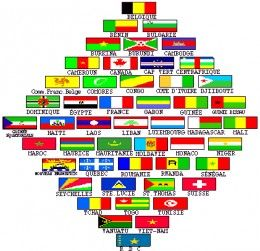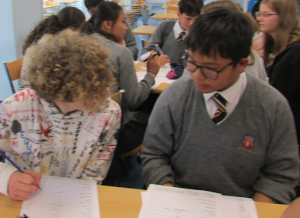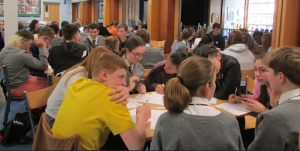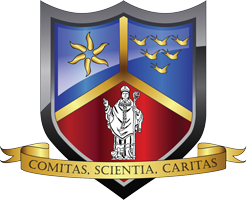French
Bonjour! Bienvenue! Enchanté! À bientôt!
1. French is spoken in countries on five continents in the world. French is the official language of France and it is also spoken in Monaco, Luxembourg, some parts of Belgium and Switzerland, in the Canadian province of Québec, parts of North and Central Africa, Vietnam, Cambodia, Madagascar and the French Overseas Departments and Territories.


3. French is the language most sought after by employers in Britain looking for language skills. It was rated as the most useful language to their organisation by over 50% of companies. (Source: CBI/Pearson Education and Skills Survey 2017). French has also been identified as the language that the UK will need most for business and trade in the future. (Source: Department of International Trade Strategy 2017)
4. France is the world’s top tourist destination (83.7 million visitors in 2015 in an annual study carried out by the United Nations World Tourism Organisation). The ability to speak even a little French makes it so much more enjoyable when visiting a country. French also comes in handy when travelling to other worldwide destinations such as Africa and Canada.
5. Learning French can help you understand English better. If you are an English speaker, one of the best reasons to learn French is to help you understand more about English. Although English is a Germanic language, fifty per cent of current English vocabulary is derived from French. Therefore, learning French could even increase the number of English words you know.
6. French is the international language in many areas of world culture such as cooking, fashion, art and dance.
Find out more about the value of studying French from a recent British Council Study:
https://www.britishcouncil.org/voices-magazine/french-precise-romantic-influential-close-english
Year 7, 8 and 9
The focus during Year 7, 8 and 9 is on building a core vocabulary, phonics and grammar knowledge for our pupils so that they can start to communicate with confidence and to develop their understanding of both written and spoken texts drawn from a variety of resources including authentic materials. We follow a scheme of work which focuses on developing the skills of listening, reading, writing and speaking as well as translation which are required by the GCSE examination. Above all, we aim to help pupils to become effective language learners whilst offering a cultural insight into France and the French-speaking world.
Support Resources for Year 7, 8 and 9 French
All pupils are given a personal booklet for each unit of work tailored to support their learning in class and at home. Learning in class is supplemented by use of the interactive ‘Dynamo 1’ textbook for year 7 and 8 as well as the OUP ‘Allez 1’ and ‘Allez 2’ textbooks during Key Stage 3. Pupils are also set regular independent learning tasks using www.memrise.com, www.quizlet.com and the Duolingo app.
Year 10 and 11
GCSE French course (Examination board: AQA)
At St Richard’s, we are using the AQA examination board.
Themes that are covered in the GCSE French course include the following:
Theme 1: Identity and Culture
- Me, my family and friends
- Technology in everyday life
- Free-time activities
- Customs and festivals in the target language-speaking countries/communities
Theme 2: Local national, international and global areas of interest
- Home town, neighbourhood and region
- Social issues
- Global issues
- Travel and tourism
Theme 3: Current and future study and employment
- My studies
- Life at school/college
- Education post-16
- Career choices and ambitions
Pupils will develop their language skills and will be expected to write and speak with more detail, complexity, accuracy and fluency, as well as understand authentic material that is likewise more detailed and complex. We are committed to supporting all learners to being able to use French to the best of their ability and to achieving their highest possible outcomes in their examination.
As in all GCSE Language exams, the French GCSE has a Foundation Tier (grades 1 – 5) and a Higher Tier (grades 4 – 9). Pupils must enter for all four skills at the same Tier. Each of the four skills is worth 25% of the final grade. All skills are tested in final examinations at the end of the course in year 11. The new GCSE does not include controlled assessment or coursework. Speaking examinations will be conducted by teachers in school within a time window prescribed by the examination board; they are marked externally.
Here is a link to the AQA examination board’s information about the new 1-9 GCSE French course : http://www.aqa.org.uk/subjects/languages/gcse/french-8658
Support Resources for Year 10 and 11 French
All pupils are given a personal booklet containing the core language and grammar as well as exam support materials for each topic covered for the GCSE course. Learning in class and on google classroom is also supplemented by digital and interactive resources from the ‘Studio’ Foundation and Higher textbooks which are tailored to the AQA Foundation and Higher tier exam syllabuses. Pupils are set regular GCSE vocabulary learning tasks using www.quizlet.com and www.memrise.com (each pupil is set up with a log-in as a member of a class group). Useful supplementary resources are regularly shared with classes via the school Google Drive.
French Cultural Opportunities
In 2018, 2019 and 2023, Year 8 and 9 pupils had the opportunity to take part in a four day residential trip to Normandy. Please read below some pupil reflections on what they gained from their trip to France:
The aim of the itinerary for the Year 8/9 residential trips to France is to maximise the pupils’ enjoyment of the cultural and historical aspects of the area being visited whilst also providing a variety of opportunities to practise the French language in a real-life context. Activities include: visits to significant historical sites, cultural experiences with visits to traditional bread or cheese workshops, a local market, a town trail and opportunities to taste the local cuisine.

 We have also been building up a link with a school in France where a former St. Richard’s pupil now lives and teaches! Joint cultural opportunities have included a penpal exchange of letters for GCSE French pupils and in the summer of 2023, we were delighted to welcome the French group to spend a day with our year 9 pupils in school here. This was a wonderful way for both the English and French pupils to practise their conversational skills. We look forward to developing further projects with this partner school so that our pupils can experience contact with the target language outside of the classroom.
We have also been building up a link with a school in France where a former St. Richard’s pupil now lives and teaches! Joint cultural opportunities have included a penpal exchange of letters for GCSE French pupils and in the summer of 2023, we were delighted to welcome the French group to spend a day with our year 9 pupils in school here. This was a wonderful way for both the English and French pupils to practise their conversational skills. We look forward to developing further projects with this partner school so that our pupils can experience contact with the target language outside of the classroom.






